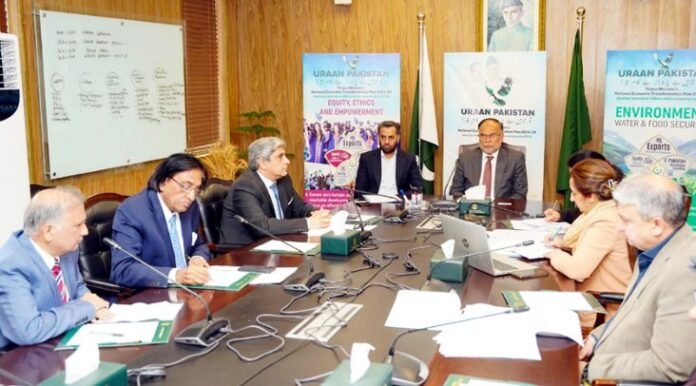Islamabad: Federal Minister for Planning, Development and Special Initiatives, Professor Ahsan Iqbal on Tuesday emphasized the urgency of a unified and comprehensive national approach to tackle the alarming rise in diabetes cases across the country.
Chairing the second meeting of the Steering Committee for the Prime Minister’s Diabetes Prevention and Control Program, the minister said, the program was aimed at raising awareness and providing preventive care to 33 million Pakistanis, adding the five-year initiative, with a total estimated cost of $6.8 million, was scheduled for completion by 2029.
Senior officials from the Ministry of Health, provincial representatives, and relevant institutions participated in the meeting.
The minister stressed that diabetes was not just a health issue but a national development challenge as it was silently eating away at country’s population’s health like termites. It is the root of many severe illnesses, and unless we act decisively, the burden will cripple the healthcare system.
The five-year national program aims to educate, screen, and treat millions across the country through a coordinated effort involving both federal and provincial stakeholders. He also stressed the importance of collaboration adding each province has been working independently, but now we must unite under a national action plan. Only then can we deliver results that match the scale of the crisis, he added.
Pakistan is currently among the three countries where diabetes is spreading most rapidly. It also ranks among the five countries most affected by tuberculosis and one of only three where polio remains a threat—facts that the minister said should serve as a wake-up call, he added.
He lamented that Pakistan made tremendous achievements in nuclear science, yet the country’s health outcomes remain dismal. This contradiction must end, he emphasized.
On the occasion, the Ministry of Health briefed the committee on a newly launched nationwide media campaign focusing on awareness, prevention, control, and treatment.
The campaign includes training for frontline health workers, the development of a national diabetes registry, and partnerships with universities for research and outreach.
The government has allocated Rs 3,000 million for the program in the current fiscal year, with an additional Rs 800 million planned for next year. Implementation agencies are currently being shortlisted to roll out program components efficiently.
A national consultative meeting is scheduled for July 2, where federal and provincial representatives will finalize cost-sharing mechanisms and streamline efforts for greater impact.
Senior officials from the Ministry of Health, provincial representatives, and relevant institutions participated in the meeting.
The federal minister stressed that diabetes was not just a health issue but a national development challenge as it was silently eating away at country’s population’s health like termites. It is the root of many severe illnesses, and unless we act decisively, the burden will cripple the healthcare system.
The five-year national program aims to educate, screen, and treat millions across the country through a coordinated effort involving both federal and provincial stakeholders. He also stressed the importance of collaboration adding each province has been working independently, but now we must unite under a national action plan. Only then can we deliver results that match the scale of the crisis, he added.
Pakistan is currently among the three countries where diabetes is spreading most rapidly. It also ranks among the five countries most affected by tuberculosis and one of only three where polio remains a threat—facts that the minister said should serve as a wake-up call, he added.
He lamented that Pakistan made tremendous achievements in nuclear science, yet the country’s health outcomes remain dismal. This contradiction must end, he emphasized.
On the occasion, the Ministry of Health briefed the committee on a newly launched nationwide media campaign focusing on awareness, prevention, control, and treatment. The campaign includes training for frontline health workers, the development of a national diabetes registry, and partnerships with universities for research and outreach.
The government has allocated Rs 3,000 million for the program in the current fiscal year, with an additional Rs 800 million planned for next year. Implementation agencies are currently being shortlisted to roll out program components efficiently.
A national consultative meeting is scheduled for July 2, where federal and provincial representatives will finalize cost-sharing mechanisms and streamline efforts for greater impact.




